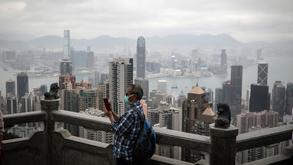 This photo taken on March 7, 2020 shows a visitor wearing a face mask at The Peak in Hong Kong. (VIVEK PRAKASH / AFP)
This photo taken on March 7, 2020 shows a visitor wearing a face mask at The Peak in Hong Kong. (VIVEK PRAKASH / AFP)
HONG KONG - Business activity in Hong Kong deteriorated further in March, a private survey showed on Friday, as demand, output and confidence plunged amid the deepening coronavirus pandemic.
While the adjusted IHS Markit headline Hong Kong Purchasing Manager’s Index (PMI) edged up to 34.9 in March, from 33.1 in February, it still signaled the second-sharpest deterioration of private sector conditions in the city since July 1998, when the survey began.
While HK's PMI edged up to 34.9 in March, from 33.1 in Feb, it still signaled the second-sharpest deterioration of private sector conditions since July 1998, according to IHS Markit
The 50-mark separates growth from contraction on a monthly basis.
The challenging business environment faced by firms led to marked reductions in hiring, purchasing activity and inventories. The pace of job shedding eased from February, but was nonetheless still sharp. There was evidence of layoffs. Meanwhile, the latest fall in input buying extended the current sequence of decline to two years and was severe overall. This contributed to another steep depletion of input inventories.
ALSO READ: Hong Kong business outlook plunges to record low on virus
“Key sectors of the economy such as retail, travel and tourism were decimated by the global coronavirus outbreak. Business activity across Hong Kong continued to contract at a severe pace in March, as new sales plummeted further,” said Bernard Aw, principal economist at IHS Markit.
Hong Kong’s small, open economy, which was already in recession, has been hit from all sides by the health crisis, particularly in the retail and tourism sectors. Retail sales fell by a record 44 percent in February from a year earlier.
The trade outlook is also grim for the bustling port as increasing health lockdowns in many parts of the world crush global demand. While factories on the Chinese mainland are gradually returning to work, growth is still well below usual levels and new orders from the mainland remain close to the record low seen in February. There are also concerns that the downturn will worsen in the second quarter as more drastic anti-virus measures may be taken worldwide, Aw added.
READ MORE: Trade council: HK exports may shrink more than 2% this year
With orders drying up, companies continued to cut back production, though the survey’s output gauge ticked up to 26.0 after plummeting to 22.5 in February. New orders also showed another severe contraction.
“The average PMI for the first quarter suggests that the Hong Kong SAR economy had fallen deeper into recession. There are also concerns that the downturn will worsen in the second quarter as more drastic anti-virus measures may be taken worldwide,” said Aw.
Business confidence, a forward-looking subcomponent in the survey, fell to its second-lowest since the data were first available in April 2012, with 59 percent of the survey respondents predicting lower output over the next 12 months due to uncertainties over the economic impact of the virus.
The seasonally adjusted unemployement rate from December to February rose to 3.7 percent, while the underemployment rate hit 1.5 percent during the same period — the highest in five years — according to Census and Statistics Department data released on March 17. In the three months ending January, the jobless rate was 3.4 percent. The SAR government has pledged a second round of financial aid worth billions of dollars to help businesses and wage earners weather the fallout of the pandemic.
With Reuters inputs


